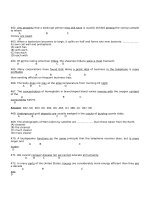Making questions
Bạn đang xem bản rút gọn của tài liệu. Xem và tải ngay bản đầy đủ của tài liệu tại đây (13.55 KB, 1 trang )
Making questions
Affirmative sentences in the simple present and simple past tense do not have an auxiliary verb. We use do,
does or did to change them into questions.
Note that do and does are used in the present tense. Do is used with plural nouns and the pronouns I, we, they
and you. Does is used with singular nouns and the pronouns he, she and it.
Did is used in the past tense with both singular and plural nouns and pronouns. Study the examples given below.
She writes short stories.
This statement is in the simple present tense and it doesn’t have an auxiliary verb. When we change this
statement into a question, we use does as the first word. Note that we use does because the subject is a third
person singular pronoun.
Does she write short stories? (NOT Does she writes short stories?)
Mike likes strawberries. (Statement)
Does Mike like strawberries? (NOT Does Mike likes strawberries?)
They live in the same house. (Statement)
Do they live in the same house? (Question)
Here we use do because the subject is a plural pronoun.
I like Beethoven. (Statement)
Do you like Beethoven? (Question)
I enjoyed the movie. (Statement)
This statement is in the simple past tense. When we change it into a question, we use did as the first word. Note
that did is used with both singular and plural nouns and pronouns.
Did you enjoy the movie? (Question) (NOT Did you enjoyed the concert?) Did + enjoy = enjoyed
I met James yesterday. (Statement)
Did you meet James yesterday? (Question)
She watched a movie last night. (Statement)
Did she watch a movie last night? (NOT Did she watched a movie last night?)
Susie called Jack in the morning. (Statement)
Did Susie call Jack in the morning? (Question) (NOT Did Susie called Jack in the morning?)
Stay on top of your writing! Download our grammar guide from www.englishgrammar.org to stay up-to-date.
Powered by TCPDF (www.tcpdf.org)









